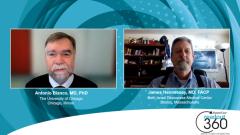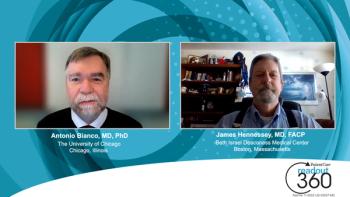
Key Takeaways for Optimizing TSH Levels in Elderly Patients With Hypothyroidism
Drs James Hennessey and Antonio Bianco talk about the optimization of levothyroxine in elderly patients with hypothyroidism.
Episodes in this series

James Hennessey, MD, FACP: For levothyroxine dosing in older patients, we must keep in mind that the primary parameter that determines the thyroid hormone dosage is the lean body mass, and as we age, our lean body mass diminishes. Not infrequently, just like with our patients who are obese, where we tend to overestimate the need for levothyroxine based upon their total body weight, in older patients we will overestimate the need for thyroid hormone replacement. That puts them at excess risk of thyrotoxicosis with its ramifications. And the TRUST study from 2009 illustrates this very succinctly, where 38% of the 54% abnormal TSH [thyrotropin levels] were overdosed. I think older people and overdosing them, we are putting them at significant risk.
Antonio Bianco, MD, PhD: I think there are studies by Anne Coppola showing that’s not a good idea.
James Hennessey, MD, FACP: It’s not a good idea to overdose the elderly.
Antonio Bianco, MD, PhD: In terms of older individuals, and I can give an example, my mom is quite old, she’s 100 years old. She just turned 100 last month.
James Hennessey, MD, FACP: Congratulations.
Antonio Bianco, MD, PhD: Her TSH is 8 [mU/L], and I have this discussion with her primary care physician all the time because he wants to put her on levothyroxine to normalize the TSH. And I remember the studies that we know from Anne Coppola and others, showing that’s probably not a good idea. As we discussed, I use that rule of thumb, every decade above 50 years old, I add 1 point to the normal range of the TSH. In her case, it would be up to 10 [mU/L] and she will be OK. But how do you see this? How do you do that with your patients?
James Hennessey, MD, FACP: I think that’s a 2-part question. The first is diagnosing significant hypothyroidism that would warrant treatment, and the second is, once we decided to treat, where should we put the TSH? I agree with you very strongly that the TRUST study showed us that in older people, and most were not 100, congratulations to your mom.
Antonio Bianco, MD, PhD: Thank you.
James Hennessey, MD, FACP: Those over 65 with modestly elevated TSH levels, in the same range that your mom has, when they were treated with thyroxin to normalize the TSH versus placebo, there was no difference in the symptomatic outcome. The good news was, because it was a clinical trial, it was very well controlled, and they did not experience any cardiovascular adverse effects. I suspect that was because of the very close titration. Inherently, it doesn’t appear to be unsafe, but there are several studies looking at the older populations who are treated with levothyroxine and inducing new thyrotoxicosis because we overdose them based upon the formula you’re talking about.
Antonio Bianco, MD, PhD: Correct.
James Hennessey, MD, FACP: The needs of levothyroxine are a lot lower because it’s all based on their lean body mass. The study from…that was looking specifically at an aging population is quite sobering. They looked at those on thyroxine and determined that 54% of them had abnormal TSHs. Now, the biggest deal there was that 38% of that total were indeed overdosed, whereas 16% were underdosed; neither 16% underdosed nor 38% overdosed are good things. I think we’re putting older people at significant risk by treating them with levothyroxine in a nontrial environment where we are not necessarily going to be able to monitor them as closely as we think is necessary.
The second part of your question is, so let’s say that your mom has a TSH of 25 [mU/L] and a low free T4 [thyroid hormone], and she’s got typical symptoms of hypothyroidism and maybe positive antibodies to TPO [thyroid peroxidase]. Then maybe you would decide that’s overt hypothyroidism and mom deserves a break today. But where would we put her TSH into the laboratory normal range? I agree with you that I would keep her on the upper end of the normal range, perhaps in the 3 to 5 [mU/L] range, something along those lines because that should be safe and would then maximize any symptomatic response that she would experience.
Transcript edited for clarity
Newsletter
Enhance your clinical practice with the Patient Care newsletter, offering the latest evidence-based guidelines, diagnostic insights, and treatment strategies for primary care physicians.




































































































































